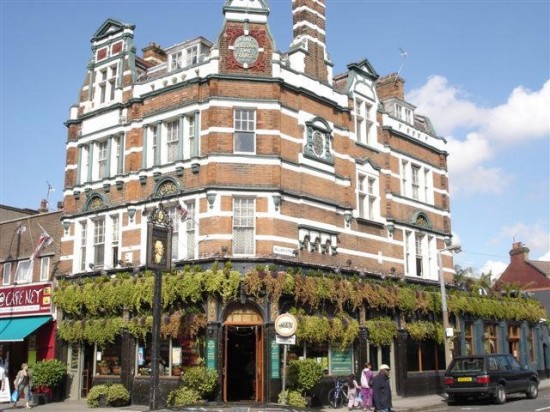by Ben McCormick & Roger Clapham
There aren’t usually many reasons to go to Leyton. Unless you follow the lowly Orient, you could in fact go your entire life without ever seeing the place. Indeed, Walthamstow’s slightly more down-at-heel neighbour seems to offer little to the outsider, save fairly cheap rent and a whole raft of second-hand furniture outlets.
But since 2008, when Jamie and Lizzie Brodie took over an abandoned brewery in London’s E10, the place has had something to shout about. All the more puzzling, then, that it seems such a well-kept secret. But perhaps that’s the point? Within 30 seconds of entering the King William IV, the ‘brewery tap’ boozer of Brodies Beers, I’m already convinced it’s a place the locals want to keep to themselves. However, having later noticed the presence of genuine beer-tickers at the bar, holdalls stuffed with notes and sampling bottles, I suspect the word may already be out.
The King William IV has stood on Leyton High Road since the mid 1800s, and is a grand old building still today. Jude Rogers mentioned it in one of her columns on this site last year, but it deserves more than that fleeting moment in the spotlight. The exterior is covered in greenery and flowers, inside its full of old school charm with historical paintings, mirrors and knick-knacks on every wall, and the back of the pub features a giant atrium you could easily park a truck in. Brodie’s brewery is housed in the smaller building the other side of the beer garden (previously home to the short-lived Sweet William microbrewery that closed in 2005) and they have produced a range of nearly 40 different beers from there, supplying not just the King William, but other pubs across London including the Jolly Butchers in Stoke Newington, and the Old Coffee House and the Cross Keys in Soho.
We kick off with a 7 Hop Session, a 3.4% version of Brodie’s own 7.7% monster 7 Hop. Its dizzying array of flowery bitterness belies its meagre strength. With more flavour and intent than many ales twice its strength, 7 Hop Session is an ideal curtain raiser for any afternoon’s sustained drinking. The IPA seems tame in comparison, with its more rounded maltiness, so we check out the cloudy Amarilla, whose crisp, light, gentle hue make it a perfect summer beer.
The afternoon’s progressing nicely and I still have change from a fiver – another reason Leyton’s locals would probably rather you didn’t know about this watering hole. It’s almost rude not to continue sampling Brodies amazing range – so we do. Out rolls a Wit, the bastard lovechild of best bitter and wheat beer, which sounds much worse than it actually is. Although probably the worst of the session, it gets better the more we take of it.
The Kiwi ale, brewed with New Zealand hops, is altogether more in keeping with the balmy April day we’re enjoying. It’s practically grapefruit juice with a dry aftertaste that begs you drink more. We decide it’s an ideal pint for the end of a proper day’s work in a sawdust factory; a sign, perhaps, that we’re already on the downhill stretch. And so it proves. The Brewer’s Gold is described as “pallow” ale, although quite what that means is anyone’s guess. However, its perfect for spring as the blossom blooms and is full of man-in-shed micro-brewed authenticity, while a pint of Brainwave becomes shandy without the fizz; the driver’s choice.
Finally, we foolishly decide we need to try the Romanov stout, a 12.1% beast. Having had imperial stouts before we should really have known better, but we egg each other on and set about what seems to be one of your grandma’s puddings, only laced with neat alcohol. The point of sensibility is gone. As it wields its club of malt, it’s no longer a beer. It’s life. At once sweet, another time sour, yet always pulling you into its disorienting tractor beam.
